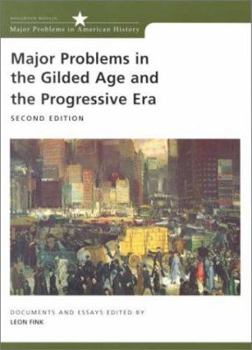Major Problems in the Gilded Age and the Progressive Era
This text presents a carefully selected group of readings, on topics such as American capitalism and the Great War, that allow students to evaluate primary sources, test the interpretations of... This description may be from another edition of this product.
Format:Paperback
Language:English
ISBN:0618042555
ISBN13:9780618042555
Release Date:August 2000
Publisher:Wadsworth Publishing
Length:512 Pages
Weight:1.71 lbs.
Dimensions:1.1" x 6.2" x 9.5"
Customer Reviews
2 ratings
An Important Book for any Student of History
Published by Thriftbooks.com User , 20 years ago
Leon Fink brings together primary and secondary sources that all but force the reader to determine the actual goings on for himself. There is distinctly absent an editorial interpretation of events or topics covered in this work, which makes it an absolute necessity for future history text writers at the primary or secondary level. They may take an important lesson from the structure and function of this book, that being that students need to see and read things for themselves in order to form a relative and informed opinion about such events. Imagine students at the high school and university levels still believing that Columbus discovered America or George Washington chopped down a cherry tree. Fink's editorial style provides much evidence of the way things ought to be. Fink does not interfere or contradict any of the primary source documents he includes here, therefore the reader will not detect any personal or political bias. The topics covered in this book range from 1875 and the Gilded Age to 1920 and the aftermath of World War I. A wide range of authors are included and various aspects of history, from poetry to stump speech are considered equal. Primary source documents, such as speeches given by big business proponents or political activists are supplemented by lengthier secondary source materials written by university scholars such as Arthur Link and David Kennedy among many others. In this format, students are able to distinguish between what we say happened and what really happened according to documented facts. Thus, students are able to sharpen critical reading and critical thinking skills exponentially by the end of this work. Naturally, the documents themselves will have a personal or political bias, as authors generally exhibit such, but the student's task will be to uncover evidence of such bias while simultaneously extruding facts. This book acts as a perfect follow up to a general American history survey, perhaps even as the required text for a sectional history course having something to do with the Gilded Age and/or Progressive Era. I wholeheartedly recommend the entire Major Problems series as they all allow a reader to perform his job task correctly: read and think critically about the topic at hand.
Excellent Social History
Published by Thriftbooks.com User , 25 years ago
I had to buy this book for a college class and I have to say that I am very impressed. Through a series of essays and primary accounts a social history of the age is brought forth, dealing with such subjects as The New South, African-American Politics Under Jim Crow, and Progressivism. These essays, by historians such as Richard Hofstadter and C. Vann Woodward, and first-hand accounts, from such notable people as W.E.B. Dubois, Carl Sandburg, Booker T. Washington, William Jennings Bryan, and Elizabeth Cady Stanton, presents a history devoid of all the wars and politics of the upper elite, but instead focuses on more social issues and the everyday American. Many topics are dealt with in this book and it shows just how complex American society was in this changing time.





